英语语言学概论第六章笔记
邢福义《语言学概论》(第2版)复习笔记和课后习题详解(语用学)【圣才出品】
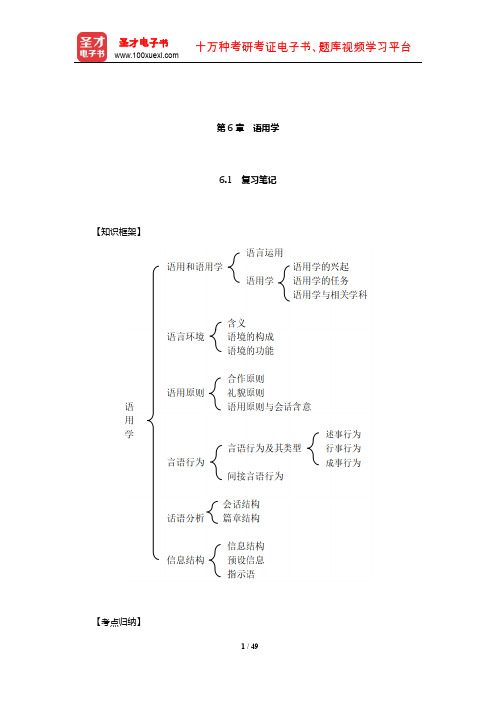
第6章语用学
6.1 复习笔记【知识框架】
【考点归纳】
考点一:语用和语用学
1.语言运用(语用)
语言运用是指交际双方在一定场合,为着一定目的,以某种方式进行的话语表达和话语理解的活动。
表6-1 语言运用(语用)
2.语用学
(1)语用学的兴起
表6-2 语用学的兴起
(2)语用学的任务
表6-3 语用学的任务
(3)语用学与相关学科
表6-4 语用学与相关学科
考点二:语言环境
1.含义
语言环境(context)简称语境。
语境是语用研究中的一个核心概念。
语境有狭义和广义之分。
表6-5 语言环境的含义
2.语境的构成
语境是由影响言语交际的各种相关因素构成的,主要包括语言内部的上下文语境和语言外部的情景语境、背景语境。
表6-6 语境的构成
3.语境的功能
语境的功能指语境对意义的表达和理解所产生的影响,语境并不是独立地发挥功能,而是参与、协助话语的表达和理解。
可以分别从话语的表达和话语的理解两个角度考察语境的功能。
表6-7 语境的功能
考点三:语用原则
1.合作原则
表6-8 合作原则。
英语语言学笔记第六章
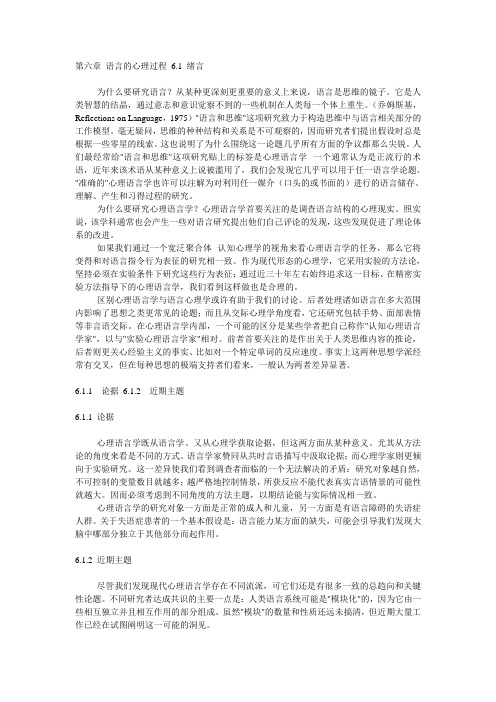
第六章语言的心理过程6.1 绪言为什么要研究语言?从某种更深刻更重要的意义上来说,语言是思维的镜子。
它是人类智慧的结晶,通过意志和意识觉察不到的一些机制在人类每一个体上重生。
(乔姆斯基,Reflections on Language,1975)"语言和思维"这项研究致力于构造思维中与语言相关部分的工作模型。
毫无疑问,思维的种种结构和关系是不可观察的,因而研究者们提出假设时总是根据一些零星的线索。
这也说明了为什么围绕这一论题几乎所有方面的争议都那么尖锐。
人们最经常给"语言和思维"这项研究贴上的标签是心理语言学--一个通常认为是正流行的术语,近年来该术语从某种意义上说被滥用了,我们会发现它几乎可以用于任一语言学论题。
"准确的"心理语言学也许可以注解为对利用任一媒介(口头的或书面的)进行的语言储存、理解、产生和习得过程的研究。
为什么要研究心理语言学?心理语言学首要关注的是调查语言结构的心理现实。
照实说,该学科通常也会产生一些对语言研究提出他们自己评论的发现,这些发现促进了理论体系的改进。
如果我们通过一个宽泛聚合体--认知心理学的视角来看心理语言学的任务,那么它将变得和对语言指令行为表征的研究相一致。
作为现代形态的心理学,它采用实验的方法论,坚持必须在实验条件下研究这些行为表征;通过近三十年左右始终追求这一目标、在精密实验方法指导下的心理语言学,我们看到这样做也是合理的。
区别心理语言学与语言心理学或许有助于我们的讨论。
后者处理诸如语言在多大范围内影响了思想之类更常见的论题;而且从交际心理学角度看,它还研究包括手势、面部表情等非言语交际。
在心理语言学内部,一个可能的区分是某些学者把自己称作"认知心理语言学家",以与"实验心理语言学家"相对。
前者首要关注的是作出关于人类思维内容的推论,后者则更关心经验主义的事实、比如对一个特定单词的反应速度。
语言学概论第六章语言的变异.

言变化往往能在本社团内很快推开而不能同样
快地扩展到其他社团,从而形成不同社会方言 或地域方言的差异。
方言差异是语言演变不平衡性的重要体现, 这种不平衡是指在不同语言社团中进展速度快 慢的不同,是在语言演变在语言外进展的不平 衡。 社会方言是指在同一地区居住的居民因年 龄、性别、职业、文化程度、阶级、原居住地 等的社会因素的不同而决定的小社团语言差异。 社会方言最常见的显著差异在词汇方面, 有时也有发音色彩(如北京的 " 女国音 " )或音 位分合上的差异。一般来说,社会方言的差别 较小 , 自由 通 话不 成 问题 ( " 黑话 " 除 外)。
语言的性别差异是显而易见的,但社会 语言学家更感兴趣的是其成因。迄今为止, 已提出了种种假说。代表性的有入侵说、禁 忌说、教育逆反说、保守说、社会声望说、 气质说等。
入侵说:是一种古老的说法。据 17 世纪西方文 献记载,当欧洲人来到西印度群岛的小安地列 斯群岛,跟当地的加勒比印第安接触时,发现 男人和女人说不同的语言。男人有他们所独有 的很多说法,女人能听懂但自己永远不说。女 人也有男人永远不用的词和短语,如果男人用 了就要受到嘲笑。这种语言差异据多米尼加土 著的野蛮人说是由于加勒比人占据了阿拉瓦克 人的岛屿后,将男子斩尽杀绝,女子纳为妻室。 这些女子生男育女并以本族语教养后代。孩子 长大后,女孩继续讲母辈的阿拉瓦克语男孩却 操父辈的加勒比语。
(二)地域方言的特点
地域方言是全民语言在不同地域上的分支。 地域方言在汉语中俗称“话”,“江浙 话”、“福建话”、“广东话”通常指的 就是吴方言、闽方言和粤方言。汉语不同 方言的词语,用汉字写下来差别不大,但 念出来,相互之间就难以听懂了。如:
语言学概论[第六章词义]山东大学期末考试知识点复习
![语言学概论[第六章词义]山东大学期末考试知识点复习](https://img.taocdn.com/s3/m/d55026793c1ec5da50e2708c.png)
第六章词义1.词汇与词汇分类词汇又叫语汇,是构成语言的基本材料。
它既可以指一种具体语言或方言中的全部的词和固定词组,也可以指语言中某类词语的总和,还可以指某个作品中所使用的词的总和。
但是它不能指一个个具体的词或固定词组。
根据词汇的稳定程度,它可以分为基本词汇与一般词汇两种。
基本词汇在语言发展中是相对稳定的,一般词汇则敏感地反映着社会的发展和人们生活的变化,于不断产生、消亡等变化之中。
基本词汇与一般词汇相对,是词汇系统的基础和核心。
标志着与人们世世代代的日常生活有密切关系的事物的词以及表示事物关系的常用虚词的总汇叫基本词汇,它是词汇中的主要部分,具有全民常用性、稳固性、能产性等特点。
一般词汇是指词汇中基本词汇以外的词。
它紧随社会的发展与人们生活的变化而变化,稳固性差,构词能力弱,有时候它可以转换为基本词汇。
它包括古语词、方言词、外来词、新造词等。
另外,从词的用途与特点来看,词汇可以分为通用词汇与专用词汇、常用词汇与罕用词汇。
2.词义词义是指人们对现实现象的反映以及由此带来的人们对现实现象的主观评价,它包括词的理性意义与附加色彩。
它具有概括性、模糊性、民族性、主观性特点。
3.词的理性意义与非理性意义词的理性意义是指以现实现象为基础,不涉及人们主观态度的词义。
它是词义的基础与核心部分。
根据人们对事物本质特征的反映情况,词的理性意义可以分为通俗意义与科学意义两种。
词的非理性意义,又叫词的附加色彩,是人们对客观世界认识的价值观念、立场态度和语言使用上的主观看法。
它附着在词的理性意义之上,可以分为三类:一是感情色彩,它有褒义、贬义与中性之分;二是语体色彩,词的语体色彩分为口语色彩和书面语色彩两种基本类型;三是形象色彩,是因为描绘人或事物的形象、情状或特征而使词带上了形象性、可感性和比喻性等特点,可以引起人们对事物视觉形象或听觉形象的联想。
4.词的本义、基本义、引申义、派生义本义是指词的有历史可查的最初的意义。
语言学概论 自学笔记 第六章 文字
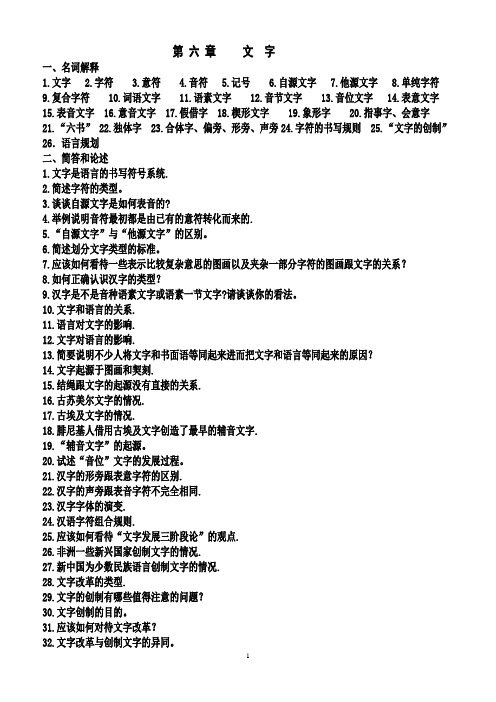
第六章文字一、名词解释1.文字2.字符3.意符4.音符5.记号6.自源文字7.他源文字8.单纯字符9.复合字符 10.词语文字 11.语素文字 12.音节文字 13.音位文字 14.表意文字15.表音文字 16.意音文字 17.假借字 18.楔形文字 19.象形字 20.指事字、会意字21.“六书” 22.独体字23.合体字、偏旁、形旁、声旁24.字符的书写规则 25.“文字的创制”26.语言规划二、简答和论述1.文字是语言的书写符号系统.2.简述字符的类型。
3.谈谈自源文字是如何表音的?4.举例说明音符最初都是由已有的意符转化而来的.5.“自源文字”与“他源文字”的区别。
6.简述划分文字类型的标准。
7.应该如何看待一些表示比较复杂意思的图画以及夹杂一部分字符的图画跟文字的关系?8.如何正确认识汉字的类型?9.汉字是不是音种语素文字或语素一节文字?请谈谈你的看法。
10.文字和语言的关系.11.语言对文字的影响.12.文字对语言的影响.13.简要说明不少人将文字和书面语等同起来进而把文字和语言等同起来的原因?14.文字起源于图画和契刻.15.结绳跟文字的起源没有直接的关系.16.古苏美尔文字的情况.17.古埃及文字的情况.18.腓尼基人借用古埃及文字创造了最早的辅音文字.19.“辅音文字”的起源。
20.试述“音位”文字的发展过程。
21.汉字的形旁跟表意字符的区别.22.汉字的声旁跟表音字符不完全相同.23.汉字字体的演变.24.汉语字符组合规则.25.应该如何看待“文字发展三阶段论”的观点.26.非洲一些新兴国家创制文字的情况.27.新中国为少数民族语言创制文字的情况.28.文字改革的类型.29.文字的创制有哪些值得注意的问题?30.文字创制的目的。
31.应该如何对待文字改革?32.文字改革与创制文字的异同。
33.在现代汉语中,诸如“日、山、火、象”这样的字很多。
这些字的共同特点表现在它们的字形与其所表示的意义之间存在着千丝万缕的关联。
语言学概论[第六章词义]山东大学期末考试知识点复习
![语言学概论[第六章词义]山东大学期末考试知识点复习](https://img.taocdn.com/s3/m/7cfc17851711cc7930b716e3.png)
第六章词义1.词汇与词汇分类词汇又叫语汇,是构成语言的基本材料.它既可以指一种具体语言或方言中的全部的词和固定词组,也可以指语言中某类词语的总和,还可以指某个作品中所使用的词的总和.但是它不能指一个个具体的词或固定词组.根据词汇的稳定程度,它可以分为基本词汇与一般词汇两种.基本词汇在语言发展中是相对稳定的,一般词汇则敏感地反映着社会的发展和人们生活的变化,于不断产生、消亡等变化之中.基本词汇与一般词汇相对,是词汇系统的基础和核心。
标志着与人们世世代代的日常生活有密切关系的事物的词以及表示事物关系的常用虚词的总汇叫基本词汇,它是词汇中的主要部分,具有全民常用性、稳固性、能产性等特点。
一般词汇是指词汇中基本词汇以外的词。
它紧随社会的发展与人们生活的变化而变化,稳固性差,构词能力弱,有时候它可以转换为基本词汇。
它包括古语词、方言词、外来词、新造词等。
另外,从词的用途与特点来看,词汇可以分为通用词汇与专用词汇、常用词汇与罕用词汇.2.词义词义是指人们对现实现象的反映以及由此带来的人们对现实现象的主观评价,它包括词的理性意义与附加色彩。
它具有概括性、模糊性、民族性、主观性特点。
3.词的理性意义与非理性意义词的理性意义是指以现实现象为基础,不涉及人们主观态度的词义.它是词义的基础与核心部分。
根据人们对事物本质特征的反映情况,词的理性意义可以分为通俗意义与科学意义两种。
词的非理性意义,又叫词的附加色彩,是人们对客观世界认识的价值观念、立场态度和语言使用上的主观看法.它附着在词的理性意义之上,可以分为三类:一是感情色彩,它有褒义、贬义与中性之分;二是语体色彩,词的语体色彩分为口语色彩和书面语色彩两种基本类型;三是形象色彩,是因为描绘人或事物的形象、情状或特征而使词带上了形象性、可感性和比喻性等特点,可以引起人们对事物视觉形象或听觉形象的联想.4.词的本义、基本义、引申义、派生义本义是指词的有历史可查的最初的意义。
语言学概论详细笔记

语言学概论详细笔记(总27页)--本页仅作为文档封面,使用时请直接删除即可----内页可以根据需求调整合适字体及大小--语言学概论目录目录 ................................................................................................................... 错误!未定义书签。
导言.................................................................................................................. 错误!未定义书签。
一、语言学的对象和任务 ....................................................................... 错误!未定义书签。
二、语言学的分类和分支学科................................................................ 错误!未定义书签。
三、语言学的功用 ................................................................................... 错误!未定义书签。
第一章语言的社会功能................................................................................... 错误!未定义书签。
第一节语言的社会功能 ........................................................................... 错误!未定义书签。
一、语言和说话的关系 .................................................................. 错误!未定义书签。
《语言学概论》复习知识点——汇总

语言学概论复习知识点考题样题单项选择第一章1.公元前四世纪,古印度人波你尼编成的梵语语法书是(A)。
A.《波你尼语法》B.《语法术》C.《尔雅》D.《语言哲学》2.生成语法的创立者是(C)。
A.雅各布逊B.特鲁别茨柯依C.乔姆斯基D.布龙菲尔德3.公元前一世纪,古希腊人特拉斯写成古希腊语语法书是(B)。
A.《波你尼语法》B.《语法术》C.《说文解字》D.《语言学》第二章4.句子的语调属于(A)。
A.语言B.言语C.说话D.句法5.下列材料,属于聚合关系的是(D)。
A. 红得很B.我们的祖国C.啪地一声D.就、只、都、刚6.下列材料,属于组合关系的是(B)。
A.–er –ment –ness -enB.热爱党C.[g k x ŋ]D.就、只、都、刚第三章7.下列哪一组音是前元音? (B)。
A.[o a]B.[a e]C.[a u]D.[o u]8.在英语中spill的p[p]和pill的p[p h]发音不同,但说英语的人认为它们是一样的,这说明p[p]、p[p h]在这些词中是(B)。
A.同一音位的典型变体 B.同一音位的条件变体C.同一音位的自由变体 D.不同的音位9.汉语中的“天气”[t h ian ʨh i]读成[t h anʨh],发生的语流音变是(D)。
A.异化B.同化C.弱化D.脱落10.下列辅音中属于塞音的是(C)。
A.[f]B. [pf]C. [c]D. [R]11.下列辅音中属于舌叶-齿龈音的是(B)。
A.[n]B. [ʃ]C. [ɕ]D. [x]12.下列辅音中属于送气音的是(A)。
A.[ts h]B. [h]C. [ʨ]D. [x]第四章13.汉语词“阿姨”的“阿”是(A)。
A.附加语素B.词根语素C.词头D. 构形语素14.俄语“сделать”(做)中的“с-”是一个(C)。
A. 词根B. 词尾C. 词头D. 后缀15.英语“worker”、“meat”两个词是(B)。
A. 前者是复合词,后者是派生词B. 前者是派生词,后者是单纯词C. 都是外来词D. 都是复合词16.英语“be”变为过去式“was”运用的语法手段是(B)。
语言学概论第六章 语言的发展

7
(一)一种语言逐步消除方言分歧而走向统一 在存在方言分歧的社会里,不同地区之间的人 们为了交际的方便,往往会选择一种方言作为各方 言区之间的交际工具,我们可以把这种语言形式叫 做“通用语”。我国古代所谓的“雅言”、“通语 ”、“四方之语”以及后来的“官话”,都是当时 的人们给这种通用语起的名称。但是,在经济上自 给自足的、分散的、没有形成统一市场的封建社会 里,各地区之间的相互往来不很普遍,频率也比较 低,通用语的使用者就可能只局限于一些官员、商 人和读书人,人数势必不多。
2
第二节
语言的分化和统一
一、语言随着社会的分化而分化 社会的分化有两种基本类型:一是社会分化为 不同的地域,即一个统一的社会在其发展过程中, 在地域上逐渐分化为若干个相对独立或完全独立的 部分;二是社会分化为不同的社群,就是在一个统 一的社会内部,因阶级、阶层、职业、年龄、性别 、文化程度、宗教等社会特征的不同而形成不同的 社会集团(又叫“社群”)。
4
(二)亲属语言 一个社会、一个民族或一种文化凭着语言等手 段得以凝聚和整合,在一定的政治历史条件下,一 个社会在地域上相对独立的部分进一步分化,走向 完全独立,分裂成几个各自完全独立的社会,原来 相对独立的地域所使用的方言可能会逐渐转变为各 自独立的语言。
5
(三)社会方言 稍加留意,我们会发现不同年龄、性别、职业 、阶级、阶层、文化程度、宗教信仰的人群所说的 话有一定的差异,语言学上把这些不同的人群称为 “言语社团”(speech community),他们所说 的话被称作“社会方言”。社会方言指的是同一种 语言或地域方言在不同的言语社团中表现出来的各 种变体。比如网民这个言语社团在网络聊天室和论 坛上进行交流时所创制和使用的所谓“网络语言” 就是一种社会方言。
语言学概论--第六章 文字

语言学概论
9
• 二、完善和扩大语言交际功能的书写符号系统 • 语言是一种符号体系,语言符号的物质形式就 是语音。语音同其他音响形式一样,延续的时间是 短暂的。当我们说完一句话,语音一落,这句话随 即就消失了。当然,我们可以把某个人说过的话储 存在记忆里,但人的记忆力是有一定限度的,也不 能做到像录音机那样准确无误。要把某人说过的一 大段话毫无差错地记住,是非常困难的,即使暂时 记住了,过一段时间也会忘记。有时很简单的一句 话,过后要复述时也往往走样。在文字诞生以前, 人们主要依靠语言来一代一代传递过去的历史、文 化遗产和劳动经验等等。这种口耳相传的方式显然 有很大的时间上和空间上的局限性。
语言学概论 15
第二节 文字的符号和类型
• 一、字符 • 字符也就是文字符号,是文字的最基本的单位, 也就是直接跟某种语言单位相联系的符号。 • 各种文字的字符,大体上可以归纳成三类,即 “意符”、“音符”和“记号”。 • 文字系统中的字符跟文字所代表的语言单位在 意义上有联系的字符是意符,如汉字“镜”当中的 “金”,“符”字里面的“竹”。在语音上有联系 的是音符,如“驱”字里面的“区”,“愈”当中 的“俞”。在语音和意义上都没有联系的字符是记 号。记号往往来源于原始的契刻符号,(鲁宾孙漂 流记里的星期五)如“一”、“二”、“三”等等; 记号也可以是硬性规定的,如现代简化字“环”里 面的“不”,“鸡”里面的“又”,“动”里面的 “力”,“烛”里面的“虫”,等等。
语言学概论 3
第一节 文字的性质
• 一、标记语言的书写符号系统 • 世界上有众多的文字,不管以何种形式出现, 都是用来标记语言的。存在没有文字的语言,但不 存在不标记任何语言的文字。我国十万人口以下的 少数民族,多数民族处于有自己的语言,而没有民 族文字的状态。我国已正式使用和经国家批准推行 的少数民族文字有19种,它们是蒙古文、藏文、维 吾尔文、朝鲜文、壮文、哈萨克文、锡伯文、傣文、 乌孜别克文、柯尔克孜文、塔塔尔文、俄罗斯文、 彝文、纳西文、苗文、景颇文、僳僳文、拉祜文和 佤文。 •
语言学 第六章

Deixis: In all lgs there are many words and expressions whose references depend entirely on the situational context of the utterance and can only be understood in light of these circumstances. This aspect of pragmatics is called deixis, which means ―pointing‖ via lge.
Context
determines the speaker’s use of language and also the hearer’s interpretation of what is said to him. e.g. it’s cold in here.
4. Sentence meaning vs. utterance meaning ― The bag is heavy.‖ a bag being heavy; an indirect, polite request, asking the hearer to help him carry the bag; the speaker is declining someone’s request for help.
In semantics, the relationship between a word and what it points to in the real world . In pragmatics, the act by which a speaker or writer uses language to enable a hearer or reader to identify something is called reference.
语言学概论知识汇总(英文)
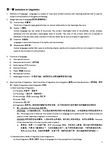
第一章Invitation to Linguistics1.Definition of language:Language is a system of vocal (and written) symbols with meaning attached that is used forhuman communication of thoughts and feelings.2.Design features of language(语言的普遍特征):①.Arbitrariness 任意性:The forms of linguistic signs generally bear no natural relationship to the meanings they carry②.Duality 二重性:Human language has two levels of structures: the primary meaningful level of morphemes, words, phrases, sentences and the secondary meaningless level of sounds. The units of the primary level are composed of elements of the secondary level, and each of the two levels has its own principles of organization.③.Creativity 创造性:Language is resourceful because of its duality and recursiveness.④.Displacement移位性:Human languages enable their users to symbolize objects, events and concepts which are not present in time and space at the moment of communication.3.Functions of language1)Informative function2)Interpersonal function人际功能3)Performative (行为) function4)Emotive function5)Phatic (寒暄) function6)Recreational function7)Metalingual function(元语言功能)指用语言去说明或解释语言的功能4.Main branches of linguistics:Main branches of linguistics (microlinguistics微观) and interdisciplinary(跨领域、跨学科)fields of linguistics (macrolinguistics宏观)1) Main branches of linguistics:(1) Phonetics发音学,语音学;(2) Phonology;(音位学、语音体系)(3) Morphology 词法/ Lexicology词汇学;(4) Syntax句法;(5) Semantics语义学(6) Pragmatics语用学:研究特定情境中的特定话语,在不同的语言交际环境中如何理解和运用语言支。
精讲-第六章_语言的运用特点——语用

重难点和考点
• 本章的重、难点和常考知识点 – 语用的性质(常考单选题、多选题)系(常考多选题、简答题) – 会话的“合作原则”和“礼貌原则”、违反会话准则 产生的会话含义(常考单选题、术语解释题、简答题) – 蕴含义和预设义(常考单选题、简答题、分析题)
)
A.语篇的上下文
B.说话的前言后语
C.言语交际情境
D.说话人的语气
【答案】C
【解析】语境指言语交际活动的环境,分为言内环境和言外环境两种。
言内环境是语话语内部的语言要素相关的语境,言外化境则是与话语外
部的非语言要素相关的语境。选项A、B、D都是言内环境,只能是B。
知识点测评题
【单选题】下面对“我已通知她明天去那儿”这句话分析正确的
三、语境和词语所指
例如: 窗户玻璃(有指、事物)——玻璃窗户(无指、性质) 这个苹果(有指)跟西瓜(无指)一般大。 借本书看(任指)——我喜欢书(全指) 客人来了(定指)——来客人了(不定指)
(此部分内容概念较多,划分较细,容易出到单选、多选 题,复习时注意辨析清楚)
例
题
【单选题】下面属于语境中的言外语境的是(
语用是指语言的运用,即人们在一定的交际环境中对语言的 运用。具体说就是根据语境条件和交际需要,选取一种交际 双方都能理解的语言符号系统,然后按照这种语言的结构规 则,寻找合适的词语形式,组词成句。
一、什么是语用
2.语用的性质 (1)情境性:语言运用离不开具体的使用环境,包括交际双方 言辞构成的上下文语境和非言辞的主客观因素构成言语环境。 其中话语的说话者|受话者、说话当时的时间、空间及其这一 时空中的所有存在又叫“物理语境”。例如: 《三国演义》中曹操“杀奢” “我去上课”(老师/学生) “我去看病”(医生/病人)
语言学概论 第五章 第六章
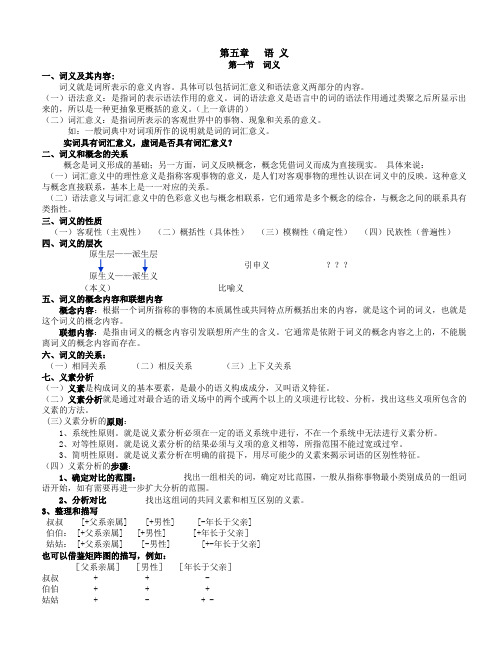
第五章语义第一节词义一、词义及其内容:词义就是词所表示的意义内容。
具体可以包括词汇意义和语法意义两部分的内容。
(一)语法意义:是指词的表示语法作用的意义。
词的语法意义是语言中的词的语法作用通过类聚之后所显示出来的,所以是一种更抽象更概括的意义。
(上一章讲的)(二)词汇意义:是指词所表示的客观世界中的事物、现象和关系的意义。
如:一般词典中对词项所作的说明就是词的词汇意义。
实词具有词汇意义,虚词是否具有词汇意义?二、词义和概念的关系概念是词义形成的基础;另一方面,词义反映概念,概念凭借词义而成为直接现实。
具体来说:(一)词汇意义中的理性意义是指称客观事物的意义,是人们对客观事物的理性认识在词义中的反映。
这种意义与概念直接联系,基本上是一一对应的关系。
(二)语法意义与词汇意义中的色彩意义也与概念相联系,它们通常是多个概念的综合,与概念之间的联系具有类指性。
三、词义的性质(一)客观性(主观性)(二)概括性(具体性)(三)模糊性(确定性)(四)民族性(普遍性)四、词义的层次原生层——派生层引申义???(本义)比喻义五、词义的概念内容和联想内容概念内容:根据一个词所指称的事物的本质属性或共同特点所概括出来的内容,就是这个词的词义,也就是这个词义的概念内容。
联想内容:是指由词义的概念内容引发联想所产生的含义。
它通常是依附于词义的概念内容之上的,不能脱离词义的概念内容而存在。
六、词义的关系:(一)相同关系(二)相反关系(三)上下义关系七、义素分析(一)义素是构成词义的基本要素,是最小的语义构成成分,又叫语义特征。
(二)义素分析就是通过对最合适的语义场中的两个或两个以上的义项进行比较、分析,找出这些义项所包含的义素的方法。
(三)义素分析的原则:1、系统性原则。
就是说义素分析必须在一定的语义系统中进行,不在一个系统中无法进行义素分析。
2、对等性原则。
就是说义素分析的结果必须与义项的意义相等,所指范围不能过宽或过窄。
语言学概论笔记
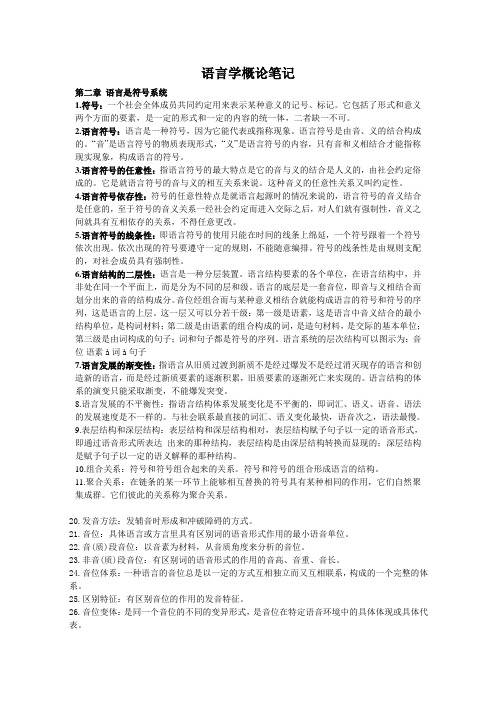
语言学概论笔记第二章语言是符号系统1.符号:一个社会全体成员共同约定用来表示某种意义的记号、标记。
它包括了形式和意义两个方面的要素,是一定的形式和一定的内容的统一体,二者缺一不可。
2.语言符号:语言是一种符号,因为它能代表或指称现象。
语言符号是由音、义的结合构成的。
“音”是语言符号的物质表现形式,“义”是语言符号的内容,只有音和义相结合才能指称现实现象,构成语言的符号。
3.语言符号的任意性:指语言符号的最大特点是它的音与义的结合是人义的,由社会约定俗成的。
它是就语言符号的音与义的相互关系来说。
这种音义的任意性关系又叫约定性。
4.语言符号依存性:符号的任意性特点是就语言起源时的情况来说的,语言符号的音义结合是任意的,至于符号的音义关系一经社会约定而进入交际之后,对人们就有强制性,音义之间就具有互相依存的关系,不得任意更改。
5.语言符号的线条性:即语言符号的使用只能在时间的线条上绵延,一个符号跟着一个符号依次出现。
依次出现的符号要遵守一定的规则,不能随意编排。
符号的线条性是由规则支配的,对社会成员具有强制性。
6.语言结构的二层性:语言是一种分层装置。
语言结构要素的各个单位,在语言结构中,并非处在同一个平面上,而是分为不同的层和级。
语言的底层是一套音位,即音与义相结合而划分出来的音的结构成分。
音位经组合而与某种意义相结合就能构成语言的符号和符号的序列,这是语言的上层。
这一层又可以分若干级:第一级是语素,这是语言中音义结合的最小结构单位,是构词材料;第二级是由语素的组合构成的词,是造句材料,是交际的基本单位;第三级是由词构成的句子;词和句子都是符号的序列。
语言系统的层次结构可以图示为:音位语素à词à句子7.语言发展的渐变性:指语言从旧质过渡到新质不是经过爆发不是经过消灭现存的语言和创造新的语言,而是经过新质要素的逐渐积累,旧质要素的逐渐死亡来实现的。
语言结构的体系的演变只能采取渐变,不能爆发突变。
语言学概论的读书笔记
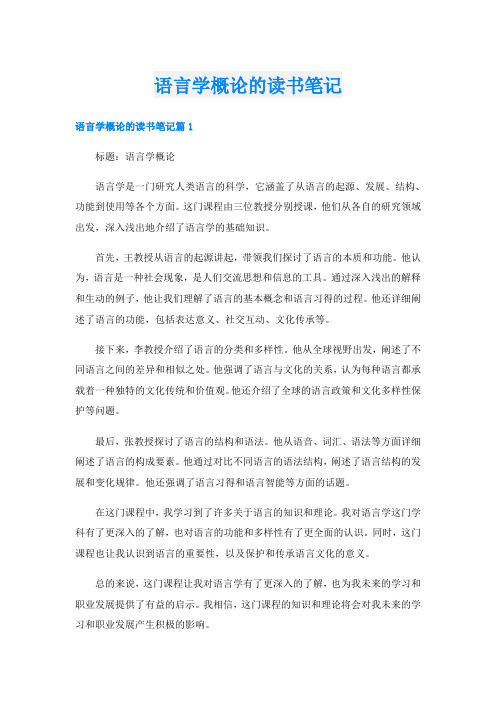
语言学概论的读书笔记语言学概论的读书笔记篇1标题:语言学概论语言学是一门研究人类语言的科学,它涵盖了从语言的起源、发展、结构、功能到使用等各个方面。
这门课程由三位教授分别授课,他们从各自的研究领域出发,深入浅出地介绍了语言学的基础知识。
首先,王教授从语言的起源讲起,带领我们探讨了语言的本质和功能。
他认为,语言是一种社会现象,是人们交流思想和信息的工具。
通过深入浅出的解释和生动的例子,他让我们理解了语言的基本概念和语言习得的过程。
他还详细阐述了语言的功能,包括表达意义、社交互动、文化传承等。
接下来,李教授介绍了语言的分类和多样性。
他从全球视野出发,阐述了不同语言之间的差异和相似之处。
他强调了语言与文化的关系,认为每种语言都承载着一种独特的文化传统和价值观。
他还介绍了全球的语言政策和文化多样性保护等问题。
最后,张教授探讨了语言的结构和语法。
他从语音、词汇、语法等方面详细阐述了语言的构成要素。
他通过对比不同语言的语法结构,阐述了语言结构的发展和变化规律。
他还强调了语言习得和语言智能等方面的话题。
在这门课程中,我学习到了许多关于语言的知识和理论。
我对语言学这门学科有了更深入的了解,也对语言的功能和多样性有了更全面的认识。
同时,这门课程也让我认识到语言的重要性,以及保护和传承语言文化的意义。
总的来说,这门课程让我对语言学有了更深入的了解,也为我未来的学习和职业发展提供了有益的启示。
我相信,这门课程的知识和理论将会对我未来的学习和职业发展产生积极的影响。
语言学概论的读书笔记篇2语言学概论:探索人类沟通的奥秘在我阅读《语言学概论》这本书的过程中,我深感语言学是一门既深奥又有趣的学科。
它研究人类沟通的符号系统,从微观的语音学和句法学,到宏观的方言学和民族语学,涵盖了语言从发音到语法再到语义的各个方面。
本书的作者对语言学的基本概念和理论进行了深入浅出的介绍,包括语音、音韵、语法、语义、方言、语言习得等。
作者以清晰、简洁的语言,将复杂的理论娓娓道来,使我对语言学有了更深入的理解。
- 1、下载文档前请自行甄别文档内容的完整性,平台不提供额外的编辑、内容补充、找答案等附加服务。
- 2、"仅部分预览"的文档,不可在线预览部分如存在完整性等问题,可反馈申请退款(可完整预览的文档不适用该条件!)。
- 3、如文档侵犯您的权益,请联系客服反馈,我们会尽快为您处理(人工客服工作时间:9:00-18:30)。
Chapter 6 Pragmatics 语用学1.What is pragmatics?什么是语用学?Pragmatics can be defined as the study of how speakers of a language use sentences to effect successful communication.As the process of communication is essentially a process of conveying meaning in a certain context, pragmatics can also be regarded as a kind of meaning study. It places the study of meaning in the context in which language is used.语用学研究的是说某种语言的人怎样用句子去实现成功的交际。
由于交际的过程从本质来说是在一定的语境中表达意义的过程,因而语用学的本质是一种意义研究。
它是一种将语言置于使用的语境中去的意义研究。
2.Pragmatics and semantics 语用学和语义学Pragmatics and semantics are both linguistic studies of meaning, but they are different. What essentially distinguishes semantics and pragmatics is whether in the study of meaning, the context of use is considered. If it is not considered, the study is restricted to the area of traditional semantics; if it is considered, the study is being carried out in the area of pragmatics.语用学和语义学都是对意义的语言学研究,但两者是不同的。
它们的本质区别在于研究意义时是否考虑了语言使用的语境。
没有考虑到语境进行的研究就没有超出传统语义学的研究范围;相反,考虑到语境进行的研究就属于语用学的研究范围。
3.Context 语境Context is essential to the pragmatic study of language. It is generally considered as constituted by the knowledge shared by the speaker and the hearer.语境是语言的语用研究中不可缺少的概念。
它一般被理解为说话者和听话者所共有的知识。
The shared knowledge is of two types: the knowledge of the language they use, and the knowledge about the world, including the general knowledge about the world and the specific knowledge about the situation in which linguistic communication is taking place.共有的知识包括他们所使用的语言方面的知识和双方对世界的认识,包括对世界的总的认识和对正在进行的语言交际所处的环境的具体认识。
4.Sentence meaning and utterance meaning 句子意义和话语意义The meaning of a sentence is abstract, and de-contextualized, while utterance meaning is concrete, and context-dependent. Utterance is based on sentence meaning; it is the realization of the abstract meaning of a sentence in a real situation of communication, or simply in a context.句子的意义是抽象的,非语境化的,而话语的意义是具体的,受语境制约的。
话语意义基于句子意义;它是一个句子的抽象意义在特定语境中的具体体现,或简而言之,在一个语境中的具体化。
5.Speech act theory 言语行为理论Speech act theory is an important theory in the pragmatic study of language. It was originated with the British philosopher John Austin in the late 50’s of the 20th century.言语行为理论是语言语用研究中的一个重要理论。
它最初是由英国哲学家约翰.奥斯汀在20世纪50年代提出的。
According to speech act theory, we are performing actions when we are speaking.根据言语行为理论,我们说话的同时是在实施某种行为。
According to speech act theory, a speaker might be performing three acts simultaneously when speaking: locutionary act, illocutionary act, and perlocutionary act.根据言语行为理论,说话者说话时可能同时实施三种行为:言内行为,言外行为和言后行为。
a) A locutionary act is the act of uttering words, phrases, clauses. It is the act of conveying literalmeaning by means of syntax lexicon and phonology.言内行为是说出词、短语和分句的行为,它是通过句法、词汇和音位来表达字面意义的行为。
b)An illocutionary act is the act of expressing the speaker’s intention; it is the act performed insaying something.言外行为是表达说话者的意图的行为,它是在说某些话时所实施的行为。
c) A perlocutionary act is the act performed by or resulting from saying something; it is theconsequence of, or the change brought about the utterance; it is the act performed by saying something.言后行为是通过某些话所实施的行为,或讲某些话所导致的行为,它是话语所产生的后果或所引起的变化,它是通过讲某些话所完成的行为。
American philosopher-linguist John Searle classified illocutionary acts into five general types. Each type has a common, general purpose.美国的哲学语言学家约翰.舍尔把言外行为分为五类,每一类行为都有一个共同的、普遍的目的。
这五大类是:a)representatives: stating or describing, saying what the speaker believes to be true阐述类:陈述或描述说话者认为是真实的情况示例:I have never seen the man before. / the earth is globe.b)directives: trying to get the hearer to do something指令类:试图使听话者做某些事情示例:Open the window! / Would you like to go to the picnic with us?c)commissives: committing the speaker himself to some future course of action承诺类:说话者自己承诺未来要有一些行为。
示例:I promise to come. / I will bring you the book tomorrow without fail.d)expressives: expressing feelings or attitude towards an existing state表达类:表达对某一现状的感情和态度。
示例:I’m sorry for the mess I have made. / It’s really kind of you to have thought of me.e)declarations: bringing about immediate changes by saying something宣告类:通过说话引起骤变。
示例:I now declare the meeting open. / I fire you.Important remark:All the acts that belong to the same category share the same purpose or the same illocutionary point, but they differ in their strength or forth.每一类中的行为都有同样的目的,但具有同样目的的言外行为可能具有不同程度的言外之力。
The roses in the gard en are beautiful, aren’t they?违反关联准则示例4:Shall we get something for the kids?Yes. But I veto I-C-E-C-R-E-A-M.违反方式准则。
